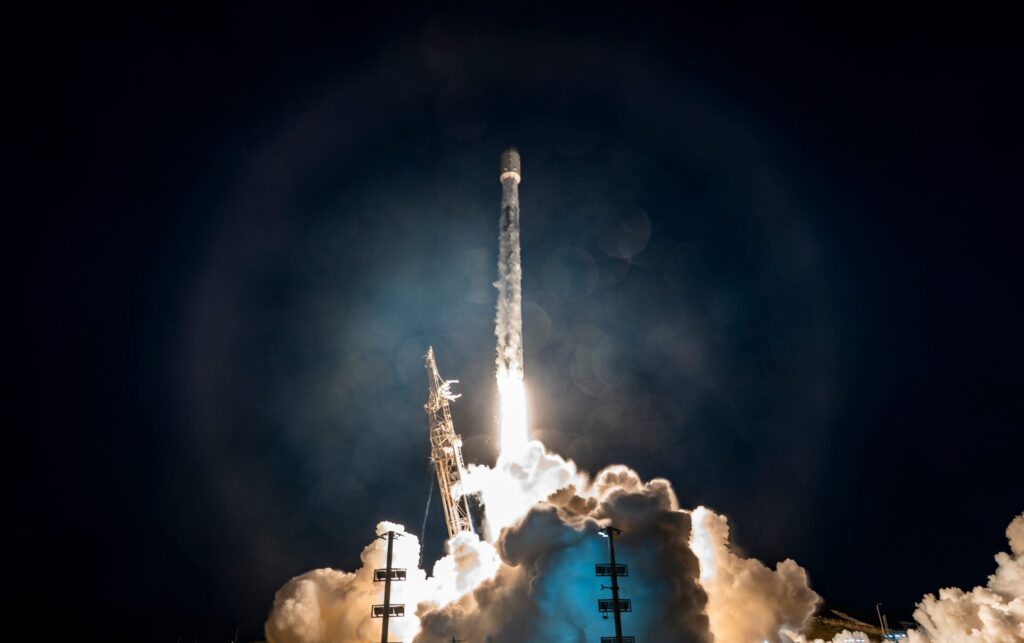SpaceX completed another successful mission on September 28, 2025, by launching 28 Starlink satellites into orbit from Vandenberg Space Force Base in California. The Falcon 9 rocket took off from Space Launch Complex 4 East at 7:04 p.m. PT/10:04 p.m. ET, marking SpaceX’s 16th orbital launch of the month. This achievement tied the company’s record for the most launches in a single month, previously set in May.
The first stage booster used for this flight, B1063, is one of SpaceX’s most experienced rockets, with Sunday’s launch being its 28th mission. This booster has previously supported significant missions such as NASA’s DART, Sentinel-6 Michael Freilich, and Transporter-7. Just 8 minutes and 25 seconds after liftoff, the booster successfully landed on the droneship “Of Course I Still Love You” in the Pacific Ocean. This landing marked the droneship’s 154th recovery and SpaceX’s 513th overall booster landing.
At 8:04 p.m. PT/11:04 p.m. ET, SpaceX confirmed the successful deployment of all 28 Starlink satellites into orbit. This launch follows SpaceX’s recent milestone of completing its 300th Starlink mission, showcasing the company’s commitment to expanding its satellite constellation. With over seven million users across 150 countries and territories, Starlink aims to bridge the global connectivity gap by providing satellite broadband with improved speeds and reliability.
Looking ahead, SpaceX is preparing for the next phase of its network by applying for FCC approval to deploy up to 15,000 next-generation Starlink Direct to Cell satellites. These satellites are designed to enhance direct cellular connectivity worldwide, further solidifying Starlink’s position as one of the most ambitious broadband projects in history.
With 124 Falcon 9 launches completed so far in 2025, SpaceX continues to push the boundaries of space exploration while scaling up the Starlink project. The company’s relentless pursuit of innovation and record-breaking launch cadence demonstrate its commitment to revolutionizing global connectivity through satellite technology. The recent surge in popularity of plant-based diets has sparked a growing interest in the benefits of adopting a vegan lifestyle. More and more people are choosing to forgo animal products in favor of a plant-based diet for a variety of reasons, including health, environmental, and ethical concerns.
One of the main reasons people are turning to veganism is for the health benefits associated with a plant-based diet. Plant-based diets are rich in fruits, vegetables, whole grains, and legumes, which are all high in essential nutrients and vitamins. A vegan diet has been shown to lower the risk of heart disease, high blood pressure, diabetes, and certain types of cancer. Additionally, plant-based diets are typically lower in saturated fats and cholesterol, which can lead to improved overall health and a reduced risk of chronic diseases.
Another reason people are choosing to go vegan is for the environmental benefits of plant-based diets. Animal agriculture is a major contributor to greenhouse gas emissions, deforestation, and water pollution. By eliminating animal products from their diets, vegans are reducing their carbon footprint and helping to combat climate change. In fact, research has shown that a vegan diet can significantly reduce an individual’s environmental impact and help to preserve our planet for future generations.
Ethical concerns also play a role in the decision to adopt a vegan lifestyle. Many people are becoming more aware of the cruelty and suffering that animals endure in the meat and dairy industries. By choosing to go vegan, individuals are taking a stand against animal exploitation and supporting a more compassionate way of living. Veganism is a way to align one’s actions with their values and promote a more ethical and humane treatment of animals.
In addition to the health, environmental, and ethical benefits of veganism, there are also practical advantages to adopting a plant-based diet. Plant-based foods are often more affordable and accessible than animal products, making it easier for people to make the switch to veganism. There are also a wide variety of delicious and nutritious plant-based recipes available, making it easy to create satisfying and flavorful meals without the need for meat or dairy.
Overall, the rise of veganism reflects a growing awareness of the impact of our food choices on our health, the environment, and animals. By choosing to go vegan, individuals can improve their health, reduce their environmental footprint, and support a more ethical and compassionate way of living. Whether for health, environmental, or ethical reasons, veganism offers a multitude of benefits for both individuals and the planet as a whole.

